Related Research Articles

Athena or Athene, often given the epithet Pallas, is an ancient Greek goddess associated with wisdom, handicraft, and warfare who was later syncretized with the Roman goddess Minerva. Athena was regarded as the patron and protectress of various cities across Greece, particularly the city of Athens, from which she most likely received her name. The Parthenon on the Acropolis of Athens is dedicated to her. Her major symbols include owls, olive trees, snakes, and the Gorgoneion. In art, she is generally depicted wearing a helmet and holding a spear.

Hera is the goddess of women, marriage, family and childbirth in ancient Greek religion and mythology, one of the twelve Olympians and the sister and wife of Zeus. She is the daughter of the Titans Cronus and Rhea. Hera rules over Mount Olympus as queen of the gods. A matronly figure, Hera served as both the patroness and protectress of married women, presiding over weddings and blessing marital unions. One of Hera's defining characteristics is her jealous and vengeful nature against Zeus' numerous lovers and illegitimate offspring, as well as the mortals who cross her.

Hades, in the ancient Greek religion and myth, is the god of the dead and the king of the underworld, with which his name became synonymous. Hades was the eldest son of Cronus and Rhea, although this also made him the last son to be regurgitated by his father. He and his brothers, Zeus and Poseidon, defeated their father's generation of gods, the Titans, and claimed rulership over the cosmos. Hades received the underworld, Zeus the sky, and Poseidon the sea, with the solid earth, long the province of Gaia, available to all three concurrently. In artistic depictions, Hades is typically portrayed holding a bident and wearing his helm with Cerberus, the three-headed guard dog of the underworld, standing to his side.
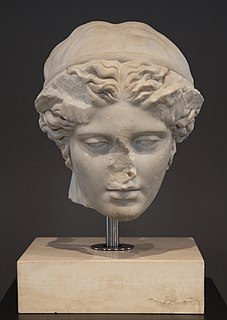
In Greek mythology, Hypnos is the personification of sleep; the Roman equivalent is known as Somnus. His name is the origin of the word hypnosis.

In Greek mythology, Prometheus is a Titan god of fire. Prometheus is best known for defying the gods by stealing fire from them and giving it to humanity in the form of technology, knowledge, and more generally, civilization. In some versions of the myth he is also credited with the creation of humanity from clay. Prometheus is known for his intelligence and for being a champion of humankind, and is also generally seen as the author of the human arts and sciences. He is sometimes presented as the father of Deucalion, the hero of the flood story.
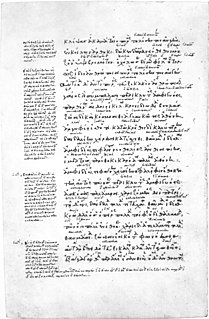
The Theogony is a poem by Hesiod describing the origins and genealogies of the Greek gods, composed c. 730–700 BC. It is written in the Epic dialect of Ancient Greek and contains 1022 lines.

Zeus is the sky and thunder god in ancient Greek religion, who rules as king of the gods of Mount Olympus. His name is cognate with the first element of his Roman equivalent Jupiter. His mythology and powers are similar, though not identical, to those of Indo-European deities such as Jupiter, Perkūnas, Perun, Indra, Dyaus and Thor.

Metis, in ancient Greek religion, was a mythical goddess, an Oceanid nymph belonging to the second generation of Titans.
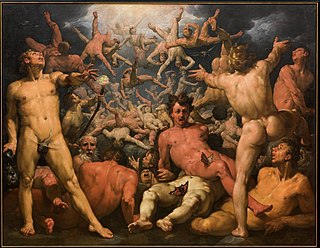
In Greek mythology, the Titans were the pre-Olympian gods. According to the Theogony of Hesiod, they were the twelve children of the primordial parents Uranus (Sky) and Gaia (Earth), with six male Titans: Oceanus, Coeus, Crius, Hyperion, Iapetus, and Cronus, and six female Titans, called the Titanides : Theia, Rhea, Themis, Mnemosyne, Phoebe, and Tethys. Cronus mated with his older sister Rhea and together they became the parents of the first generation of Olympians – the six siblings Zeus, Hades, Poseidon, Hestia, Demeter, and Hera. Some descendants of the Titans, such as Prometheus, Helios, and Leto, are sometimes also called Titans.
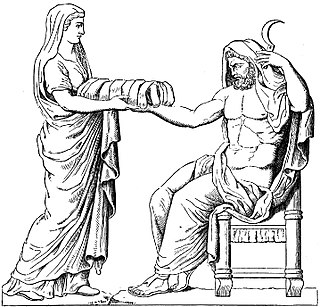
Rhea or Rheia is a goddess in Greek mythology, the Titaness daughter of the earth goddess Gaia and the sky god Uranus, Gaia's son. She is the older sister of Cronus, who was also her consort. In early traditions, she is known as "the mother of gods" and therefore is strongly associated with Gaia and Cybele, who have similar functions. The classical Greeks saw her as the mother of the Olympian gods and goddesses. The Romans identified her with Magna Mater, and the Goddess Ops.
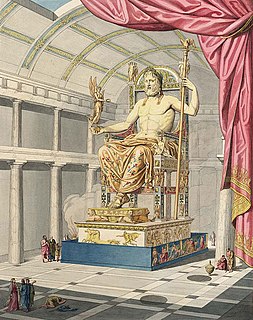
The Statue of Zeus at Olympia was a giant seated figure, about 12.4 m (41 ft) tall, made by the Greek sculptor Phidias around 435 BC at the sanctuary of Olympia, Greece, and erected in the Temple of Zeus there. Zeus is the sky and thunder god in ancient Greek religion, who rules as king of the gods of Mount Olympus.

In ancient Greek religion and mythology, the Moirai, often known in English as the Fates, were the incarnations of destiny; their Roman equivalent was the Parcae, and there are other equivalents in cultures that descend from the Proto-Indo-European culture. Their number became fixed at three: Clotho ("spinner"), Lachesis ("allotter") and Atropos.
In Greek mythology, Kratos is the divine personification of strength. He is the son of Pallas and Styx. Kratos and his siblings Nike ('Victory'), Bia ('Force'), and Zelus ('Glory') are all essentially personifications of a trait. Kratos is first mentioned alongside his siblings in Hesiod's Theogony. According to Hesiod, Kratos and his siblings dwell with Zeus because their mother Styx came to him first to request a position in his regime, so he honored her and her children with exalted positions. Kratos and his sister Bia are best known for their appearance in the opening scene of Aeschylus' Prometheus Bound. Acting as agents of Zeus, they lead the captive Titan Prometheus on stage. Kratos compels the mild-mannered blacksmith god Hephaestus to chain Prometheus to a rock as punishment for his theft of fire.
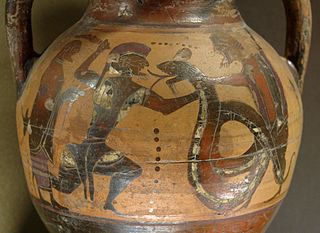
In ancient Greek religion and mythology, the twelve Olympians are the major deities of the Greek pantheon, commonly considered to be Zeus, Hera, Poseidon, Demeter, Athena, Apollo, Artemis, Ares, Hephaestus, Aphrodite, Hermes, and either Hestia or Dionysus. They were called Olympians because, according to tradition, they resided on Mount Olympus.

Zeus is a fictional character, a god appearing in American comic books published by Marvel Comics. The character is based on the god Zeus in Greek mythology.
Melinoë is a chthonic nymph or goddess invoked in one of the Orphic Hymns and represented as a bringer of nightmares and madness. The name also appears on a metal tablet in association with Persephone. The hymns are of uncertain date but were probably composed in the 2nd or 3rd century AD. In the hymn, Melinoë has characteristics that seem similar to Hecate and the Erinyes, and the name is sometimes thought to be an epithet of Hecate. The terms in which Melinoë is described are typical of moon goddesses in Greek poetry.
Hermes is a fictional character appearing in American comic books published by Marvel Comics. Hermes is the Olympian God of transitions and boundaries in Greek religion and mythology. Hermes first appeared in Thor #129 and was adapted by Stan Lee and Jack Kirby.

In Greek mythology, Cronus, Cronos, or Kronos was the leader and youngest of the first generation of Titans, the divine descendants of the primordial Gaia and Uranus. He overthrew his father and ruled during the mythological Golden Age, until he was overthrown by his own son Zeus and imprisoned in Tartarus. According to Plato, however, the deities Phorcys, Cronus, and Rhea were the eldest children of Oceanus and Tethys.

In Greek mythology, Gaia, also spelled Gaea, is the personification of the Earth and one of the Greek primordial deities. Gaia is the ancestral mother—sometimes parthenogenic—of all life. She is the mother of Uranus, from whose sexual union she bore the Titans, the Cyclopes, and the Giants; as well as of Pontus, from whose union she bore the primordial sea gods. Her equivalent in the Roman pantheon was Terra.
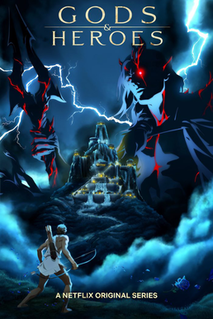
Blood of Zeus, formerly known as Gods & Heroes, is an American adult animated television series created by Charley and Vlas Parlapanides for Netflix. Produced by Powerhouse Animation Studios with the animation outsourced to South Korean studios Mua Film and Hanho Heung-Up, the series was released on October 27, 2020, on Netflix.